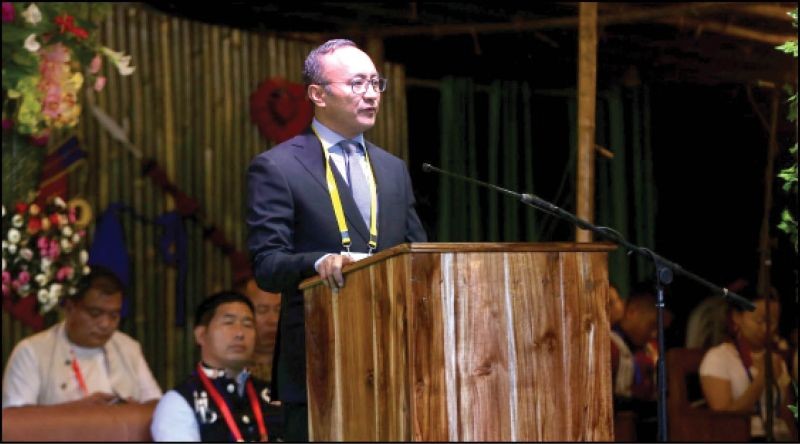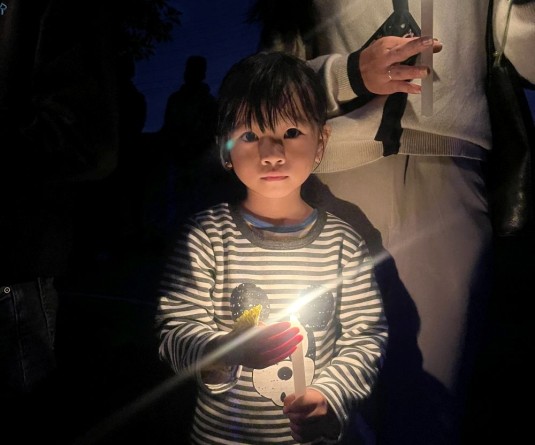Advisor, IT, S&T and NRE, Mhonlumo Kikon addressing the introductory session of the Naga Students' Federation at Bhandari town on Wednesday evening. (Photo courtesy: Kilo Media)

Morung Express News
Bhandari | May 8
The 28th general conference of the Naga Students' Federation got underway at Bhandari town, Wokha, with 'For a just future' as the theme of the conference.
"For many years now the Naga people's lives and future have been swinging between hope and uncertainty. Dreams and aspirations have been overwhelmed in the matrix of political conflicts, violence and instability" the NSF stated in a note on the theme of the conference.
Against such backdrop, the federation said for the new to be born, it is vital to recognise that the present context is one that comprises of political conflict, division of the Naga people, intra-conflict, nepotism and favouritism, corruption, structural violence and so on.
At the present junction, the NSF said the Naga youth need to take a decisive stand on questions of peace and dialogue, reconciliation and healing, governance and accountability, development and growth, and all aspects of building the Naga future.
"In this, the NSF calls upon all the Naga youth beyond borders to come forward to share their concern and work together to structure a Naga future in the realms of fairness and justice", the federation said.
All the 17 federating units and subordinate bodies are attending the conference.
Advisor for IT, S&T and NRE, Mmhonlumo Kikon while addressing the introductory session said that when indigenous revitalization is discussed solely in terms of strategies, rights, and theories, “they overlook the everyday practices of resurgence and decolonization.”
He pointed to the oil exploration issue in Wokha district as an example. In 1994, the NSF had led the movement for a rights based approach to development of the oil and natural gas resources, being explored by ONGC at Changpang and Tssori. This led to the closure of the entire exploration.
“The reasons were simple: rights of the landowners were not respected as the ONGC continued to explore beyond the agreed terms and the benefits accrued were not shared substantially by the state government with the people,” Kikon said.
In 2014, the Nagaland State Government issued permit to explore oil, despite overtures by the Lotha Students’ Union for a dialogue on the Nagaland Petroleum and Natural Gas (NPNG) Rules. Kikon lamented that the government’s response was “brutal” as it refused any dialogue and decided to award the permit to “a company with little or no experience to go for exploration and exploitation of the oil resource.” He also recalled the LSU protest was met with lathi-charge and curfews.
Therefore, the Advisor said it was appropriate that the general conference gathering will be visiting the fields at Changpang as a “process of reclamation and restoration of our rights.”
Kikon meanwhile stated that “rights are political constructs that do not necessarily reflect inherent indigenous responsibilities to their lands and resources.” “Additionally the rights discourse compartmentalizes indigenous self-determination by separating questions of governance and community well-being from villages/lands and relationships to the environment,” he added.
Describing the incidents which led to the Lotha Hoho’s move to go to court with regard to the NPNG Rules, and its subsequent withdrawal after government intervention, Kikon claimed that the current PDA government “is sensitive to the needs of the people.”
He also pointed to similar issues of chromite mining and the Mapithel Dam in Ukhrul, and stated that “Nagas have risen to balance development and rights of the people.”
“Have the rights of the people been respected and have they been allowed to determine for themselves in which way development should take place? How has the apex bodies of the Nagas responded to these issues? Have they been able to secure and articulate the rights of the people that they must represent? Or have there been collusions of various agencies to deprive the right to development of the people?” he said.
The visit envisaged by NSF to Changpang oil fields, Kikon viewed, is part of “examining the community resurgence, to question the issue of sustainability and subsistence and to assess political harm and restore cultural practices.”
Quoting Professor Erica-Irene Daes, UN Special Rapporteur, Kikon stated that “few if any limitations on indigenous resource rights are appropriate, because the indigenous ownership of resources is associated with the most important and fundamental of human rights: the right to life, food, shelter, the right to self-determination, and the right to exist as a people.”
The Naga notion of sustainability, he added, involves upholding one’s responsibilities to the land and the environment and giving back more than one takes, rather than simply residing on the land.
Meanwhile, stating that the Indo-Naga peace is not a “zero sum game,” Kikon said that the peace process is “bigger than all of us.” “The Naga issue and the future of the Naga People are bigger than all of us. Let us rise beyond our own tribes and affirm that whether we are known as south Nagas or eastern Nagas or central Nagas, there is only one Naga family and we are all part of that beautiful family,” he said.




